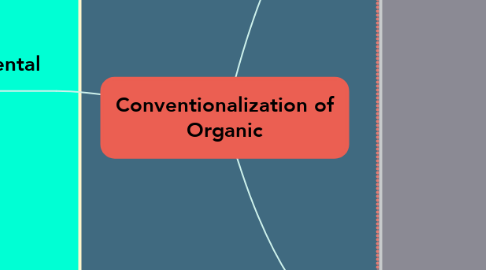
1. Environmental
1.1. Water Rights
1.1.1. How much water should/can be used throughout the growing process.
1.2. Grown in a greenhouse or in a field?
1.2.1. Site will impact growth of the product
1.3. Genetically Engineered Plants
1.3.1. Insect/pest resistant
1.3.1.1. Heat, cold, drought tolerant
1.3.1.1.1. Herbicide tolerant
1.4. Potential for Increased Pesticide Usage
1.4.1. Pesticide runoff/off-target drift
1.4.1.1. Pesticide contact w/non-target organisms
1.5. Potential for Increased herbicide usage
2. Economic
2.1. Corporations who grow/produce organic crops
2.1.1. Increased Profits
2.1.1.1. Upscale of industry
2.2. Cost/scale of operation
2.2.1. Does it make sense? Is it efficient?
2.2.1.1. Conventional production vs. organic production
2.2.1.1.1. Are conventional crops better or worse?
2.3. Market demand/pricing
2.3.1. How much the product costs
2.3.1.1. Who has access to the product
2.3.1.1.1. Effect on consumer market
2.4. Locally grown vs. transported goods
2.4.1. Where does the product come from? Who ships it? How is it processed?
2.5. Lower food prices?
2.6. Sellers/Distributors
2.6.1. How do they market organic crops and conventional crops?
3. Social
3.1. Worker rights
3.1.1. Pay, hours, fair wages, job duties
3.2. Political
3.2.1. People who make laws/the ones in charge of production
3.2.1.1. Land rights
3.3. Health of product
3.3.1. Are conventional crops safe?
3.3.1.1. Are organically and conventionally grown products inspected for quality prior to shipment?
3.4. Consumer Safety
3.5. Reducing food scarcity
3.5.1. Advanced crop production
3.6. Human health risk?
3.6.1. Short term and long term
3.6.1.1. How do we know if conventional crops are bad for people?

